GUESS began in 1981, founded by the Marciano brothers, who seamlessly blended their French heritage with American fashion sensibilities. They launched their brand with the iconic Marilyn Jean, which quickly garnered attention, leading to Bloomingdale's selling out their initial order. The brand's identity is characterized by a spirit of youthful adventure and an aspirational lifestyle, effectively captured through bold marketing campaigns that catapulted unknown models to stardom. As GUESS expanded its product lines and increased its global footprint, it skillfully navigated the ever-changing landscape of fashion trends. However, the brand also faced legal and ethical challenges that sparked important discussions about labor rights. Exploring this evolution reveals a rich and complex narrative of fashion, aspiration, and cultural influence.
Founding of GUESS
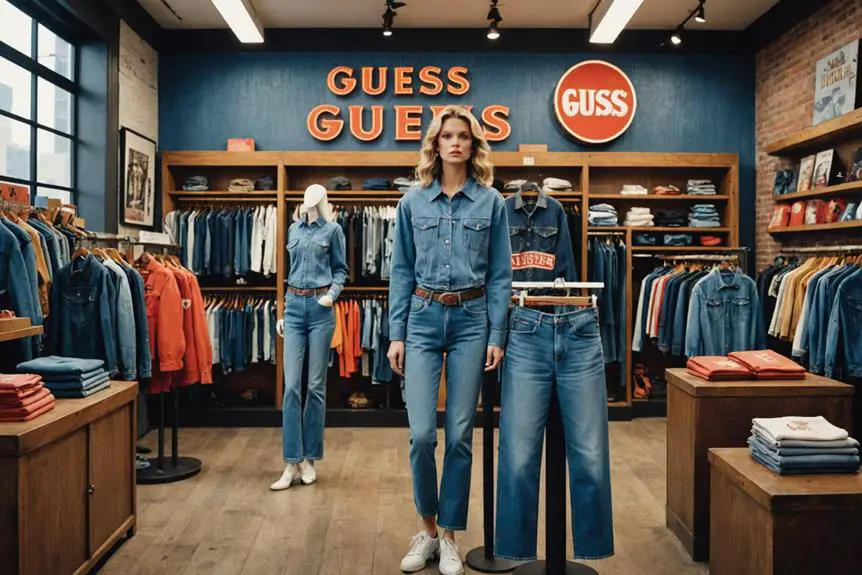
GUESS was founded in 1981 by the Marciano brothers—Georges, Maurice, Armand, and Paul—who drew inspiration from their French heritage and the vibrant European fashion scene. Their vision redefined American denim, turning it into a coveted fashion statement. The brand's initial product, the Marilyn Jean, was a stonewashed, slim-fitting design featuring a unique three-zip closure. This innovative approach quickly caught the attention of fashion enthusiasts, setting the stage for GUESS's rise.
When GUESS secured its first order from Bloomingdales, consisting of just two dozen pairs of jeans, the demand exceeded expectations, resulting in a swift sell-out. This moment marked the beginning of a remarkable success story, as the brand rapidly expanded into major U.S. department stores within a year of its founding. The Marciano brothers effectively reclaimed denim as a fashionable item, leveraging their European influence to introduce innovative cuts and washes.
Headquartered on Olympic Boulevard in Los Angeles, GUESS embodies the American dream, reflecting both its origins and its connection to the thriving American fashion scene. The brand's early days established it as an iconic name in denim, forever altering the landscape of casual wear.
Brand Identity and Lifestyle
Building on its innovative approach to denim, the brand has cultivated a distinct identity that resonates with a young, sexy, and adventurous lifestyle. GUESS effectively markets itself as a trendsetter, using iconic advertising to establish an aspirational messaging framework. By featuring unknown faces who rise to fame through their campaigns, GUESS creates a narrative that invites its diverse consumer base to dream big and embrace their individuality.
This strategy not only enhances the brand's timeless appeal but also emphasizes a lifestyle aesthetic that remains relevant across changing fashion trends. Each advertising campaign showcases innovative and provocative imagery, guaranteeing that GUESS stands out in a crowded market. The brand's commitment to a lifestyle image resonates globally, attracting consumers who seek to embody the adventurous spirit that GUESS represents.
As you engage with the brand, you'll notice that GUESS doesn't just sell clothes; it sells a lifestyle. It invites you to partake in a world filled with excitement and allure, where every piece of clothing becomes a statement of your own aspirations. This focus on brand identity guarantees that GUESS remains a powerful force in the fashion industry, continually appealing to those who embrace a sexy, adventurous way of life.
Product Line Expansion
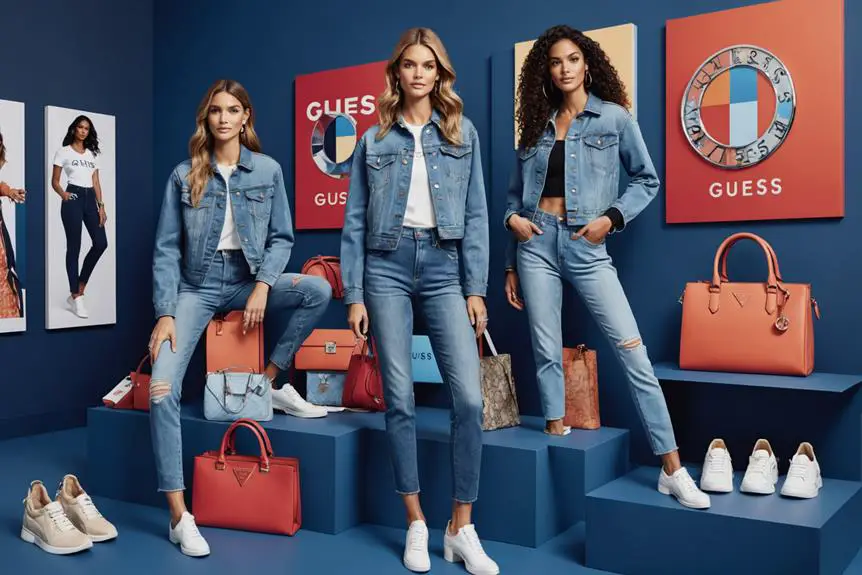
Through strategic product line expansion, GUESS has effectively broadened its appeal and solidified its presence in the fashion industry. The introduction of the Marciano brand in 2004 marked a significant milestone, offering contemporary fashion collections for both men and women. This move showcased GUESS's commitment to diversifying its product lines to include:
- Denim: Signature pieces that resonate with the brand's roots.
- Apparel: Trendy fashion that caters to a wide range of styles.
- Accessories: Complementary items that enhance the overall look.
- Fragrances and Eyewear: Lifestyle products that reflect the Southern California aesthetic.
In 2007, GUESS launched G by GUESS, targeting a younger demographic and further emphasizing the brand's identity. This innovative retail concept aligns perfectly with the evolving tastes of consumers, ensuring GUESS remains at the forefront of contemporary fashion. The brand's focus on seasonal designs and its commitment to providing trendy fashion across all age groups demonstrate its adaptability and relevance. By continually expanding its product offerings, GUESS not only attracts a diverse customer base but also reinforces its strong brand identity within the competitive landscape of fashion.
Global Presence and Reach
The global footprint of GUESS reflects its status as a prominent lifestyle brand, operating in over 80 countries and boasting more than 1,500 retail stores. This impressive expansion illustrates GUESS's commitment to establishing brand recognition across diverse cultural markets. By offering a wide range of products, including denim, apparel, and accessories, the brand effectively caters to varying consumer demands.
| Category | Product Type | Market Strategy |
|---|---|---|
| Global Lifestyle Brand | Denim | Adapt styles to cultures |
| Retail Stores | Apparel | Innovative offerings |
| Brand Recognition | Accessories | Timeless advertising campaigns |
GUESS's international reach is bolstered by strategic expansion plans that focus on evolving fashion trends. The brand's ability to adapt its marketing strategies while maintaining a consistent identity is key to its success. You can see how GUESS tailors its approach to resonate with different cultural markets, ensuring that its timeless advertising campaigns effectively engage and attract a diverse audience. This adaptability solidifies GUESS's position as a leader in the global fashion landscape.
Marketing Strategies and Cultural Impact
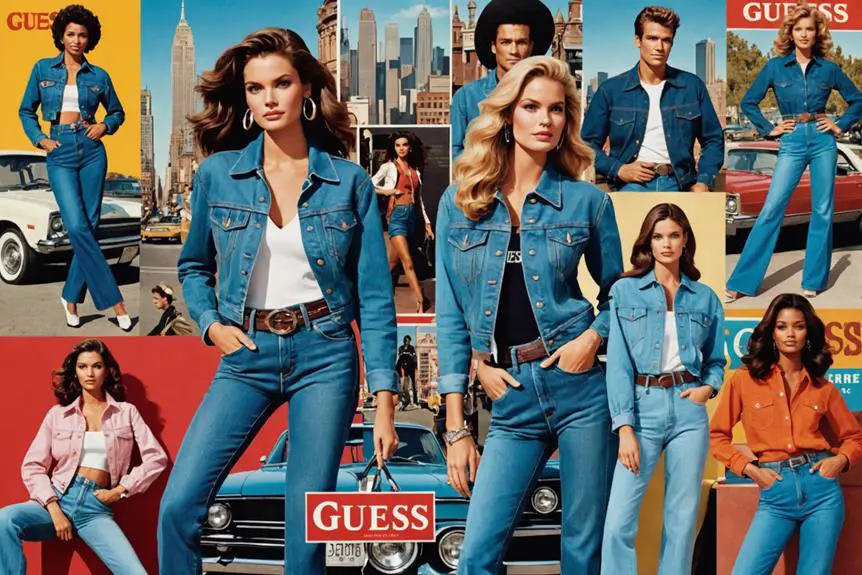
GUESS has consistently pushed the envelope with its marketing strategies, crafting campaigns that not only captivate but also resonate deeply with diverse audiences. The brand's innovative approach to advertising has established it as an iconic name in fashion, drawing consumers into a youthful lifestyle that many aspire to embody.
Here are some key elements of GUESS's marketing success:
- Provocative Campaigns: Featuring iconic models like Claudia Schiffer and Naomi Campbell, these campaigns transformed faces into household names, markedly boosting brand recognition.
- Nostalgic References: By blending classic Hollywood allure with contemporary fashion, GUESS appeals to various demographics, setting industry trends.
- Celebrity Collaborations: Partnering with influencers like Jennifer Lopez and Gigi Hadid has rejuvenated GUESS's image, connecting it with younger consumers.
- Social Media Engagement: Effective use of social platforms enhances consumer interaction and maintains brand relevance, appealing to fashion enthusiasts across generations.
Through these strategies, GUESS has not only established its brand but also created a cultural impact that continues to influence the fashion landscape, ensuring its place as a leader in the industry.
Legal Challenges and Ethical Concerns
In recent years, legal challenges and ethical concerns have surfaced as significant hurdles for GUESS, revealing the complexities of traversing the fashion industry. The company's history is marred by notable lawsuits, including a 2009 trademark infringement case with Gucci, which culminated in a $4.7 million judgment against GUESS in 2012. Additionally, accusations of unauthorized use of Banksy's artwork in 2022 ignited further legal disputes over intellectual property rights, demonstrating the brand's ongoing struggles with creative ownership.
Ethical concerns are equally pressing. In the 1980s, allegations surfaced that GUESS employed sweatshop contractors in Los Angeles, leading to a 1992 litigation by the US Department of Labor for wage violations. To mitigate such risks, GUESS entered a voluntary monitoring agreement aimed at upholding labor rights. Despite these efforts, reports like "Cross Border Blues" have highlighted persistent injustices faced by garment workers, prompting advocacy for worker rights. As GUESS navigates these legal and ethical waters, it must reconcile profitability with responsibility, ensuring its practices align with the growing demand for transparency and fairness in the fashion industry.
Frequently Asked Questions
What Is the Brief History of Guess?
You'll find that GUESS emerged in 1981, quickly gaining attention with unique designs and bold marketing. By forging strategic partnerships and expanding globally, it transformed into a significant player in the fashion industry over decades.
Why Is the Brand Called Guess?
The brand's name "GUESS" evokes curiosity, inviting you to explore its offerings. Inspired by an advertising slogan, it reflects a playful identity and aligns with their aspirational marketing strategy, encouraging you to dream and discover.
What Is the History of Guess Jewelry?
You'll find that GUESS Jewelry emerged as an extension of the brand's lifestyle offerings, incorporating trendy designs aimed at a youthful audience. Collaborations with influencers further enhanced its appeal and visibility in contemporary fashion.
What Is the History of the Guess Who Game?
Guess Who, launched in 1979, engages you in a fun two-player guessing game. You ask yes or no questions to identify a hidden character, making it a timeless favorite among family and friends.
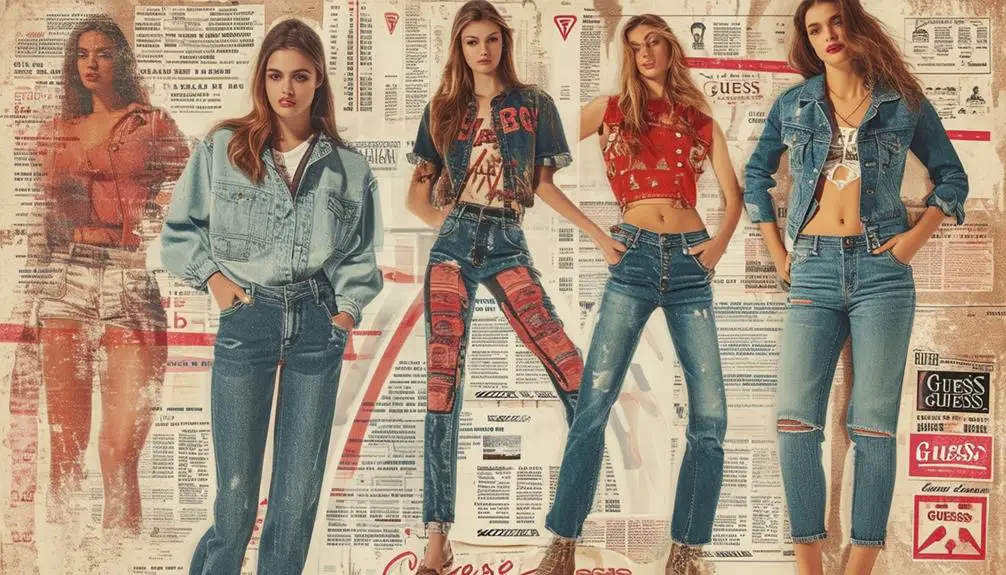


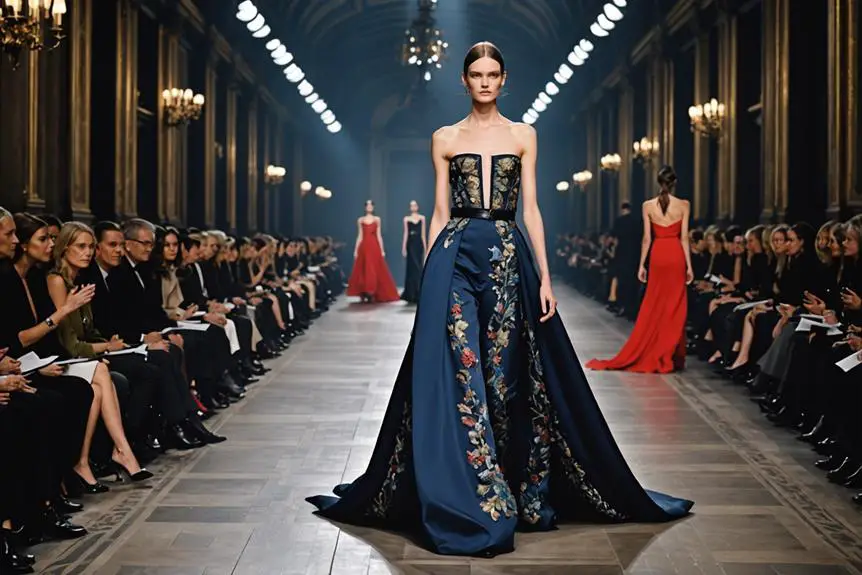

2 Comments